Are you looking for a strategy that works best for healthcare PPC advertising?
Studies estimate that 1 in every 20 searches on Google is health-related.
It can be difficult to attract potential patients to your medical practice when competing with other doctors in your area. With so many options available, there will be patients who go elsewhere even if they need medical care.
Luckily, healthcare PPC ads make it easy to get your name out there, so people looking for medical services from a doctor like you will find you and make an appointment at your practice instead of another one down the street.
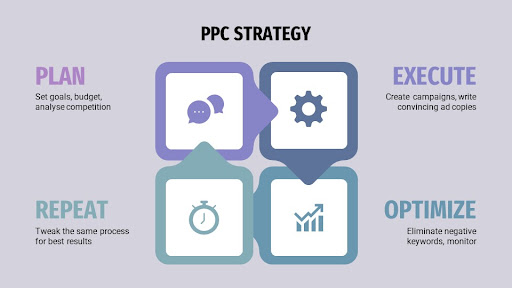
(Source: Thoughts Mag)
When advertising your medical practice, you want to ensure that you’re reaching the right people and getting them in your office without paying too much in advertising costs.
Healthcare Google Ads and Facebook Ads are two highly effective ways to get your message out to thousands of individuals at once, but which one should you choose? Read on and learn why a hybrid campaign between Google Ads and Facebook Ads may be best for your practice.
Here’s an outline to help you navigate this article with ease:
- What is PPC advertising, and why should your practice utilize it?
- Google Ads for hospital advertising
- Facebook Ads for hospital advertising
- Google Ads vs. Facebook Ads for healthcare: 5 Key differences
- Google Ads vs. Facebook Ads: Which is best for your medical practice?
- What is PPC Advertising, and Why Should Your Practice Utilize It?
- 1) Quality Control
- 2) Targeted Visibility
- 3) Greater Outreach
- 4) Demographic Finesse
- Google Ads for Hospital Advertising
- Facebook Ads for Hospital Advertising
- Google vs Facebook Ads for Healthcare: 5 Key Differences
- 1) Customer-base
- 2) Buyer Intent
- 3) Price
- 4) Ad Formats
- Google vs Facebook Ads: Which is Best for Your Medical Practice?
- Leverage a Hybrid Google and Facebook Ads Strategy
What is PPC Advertising, and Why Should Your Practice Utilize It?
Healthcare PPC advertising involves businesses paying to have their ads appear alongside search results when a user performs a search. Most commonly, PPC for healthcare marketing takes place on search engines like Google, although it can also happen on social media networks such as Facebook.
Online advertising is critical to any medical practice’s marketing strategy because it provides a way to reach potential patients. Still, healthcare PPC ads—the umbrella term covering Google Ads, Facebook Ads, and other pay-per-click platforms—can be intimidating.
There are a lot of factors to consider, from writing high-quality ads to choosing keywords and managing budgets.
Nowadays, it’s not enough to just have an online presence. The most effective way to generate leads in a competitive environment like healthcare is to have good healthcare PPC ad practices in place.
Let’s walk you through four reasons why your medical practice should utilize medical PPC advertising as part of your digital marketing strategy:
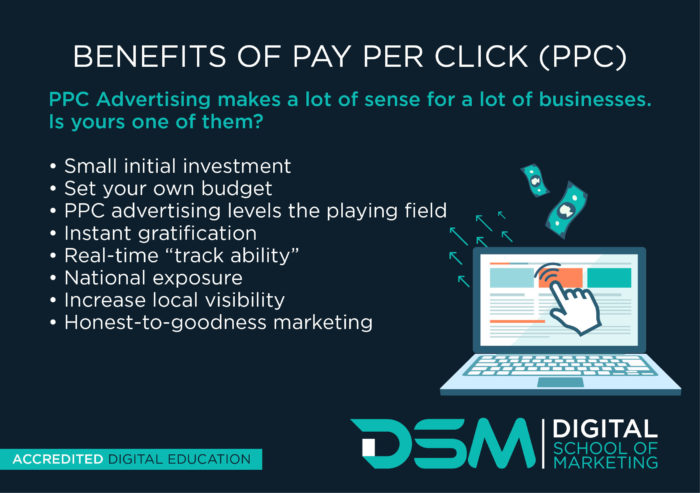
(Source: Digital School of Marketing)
1) Quality Control
Since you’re paying per click, limiting your budget and driving plenty of traffic is easy. Plus, since you can use multiple ads per campaign, you’ll only be charged when one of your ads brings a new patient into your practice.
Setting up a budget and carefully tracking impressions versus conversions (the number of times someone clicks on an ad) makes it easy to create an effective marketing campaign using healthcare PPC ads.
When done right, PPC hospital ads can be used in concert with many other channels, from email campaigns to search engine optimization, to ensure that every dollar spent will generate new patients. It’s an efficient way to get more bang for your buck and create a solid return on investment (ROI).
2) Targeted Visibility
You can increase your visibility to reach potential patients actively searching for a medical practice like yours by advertising on Google search. It allows you to target your audience with more accuracy while reaching out to prospects already interested in what you offer.
3) Greater Outreach
Reach patients when they’re actively searching for a solution to their health-related issues. You don’t have to force yourself onto sites or pages that aren’t relevant to your brand.
By paying Google, Facebook, or another search engine per click, you can drive targeted traffic directly to your site and convert those visitors into patients.
4) Demographic Finesse
Medical PPC ads allow you to focus your campaign on specific segments of people regarding location and age. For example, if your practice specializes in caring for geriatric patients, it will be beneficial to target that demographic.
Doing this will allow you to capture them when they’re actively looking into medical care options and are more likely to convert.
Also, you can target potential patients based on their location (zip code), so you don’t waste money targeting people who live far away from you or out of state.
Google Ads for Hospital Advertising
Are you new to Google Ads? If so, you’re in the right place. Google’s advertising platform is an incredible resource and can be used by medical practices, hospitals, and healthcare professionals alike to reach patients and engage with them. That explains why 76% of the United States healthcare facilities use Google Ads.
Healthcare Google ads (or healthcare paid search) are a form of PPC hospital marketing that allows you to put your advertisements on Google’s sites and services, including Search, Gmail, YouTube, etc. It also includes placing ads on third-party websites or apps that have agreed to show healthcare Google ads.
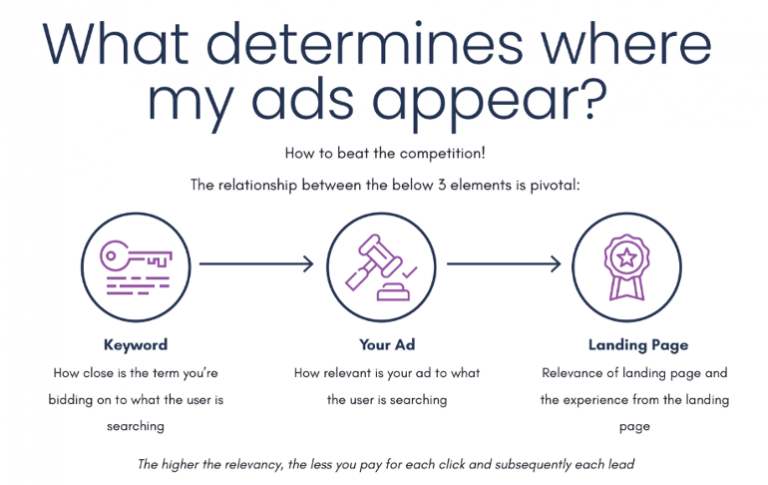
(Source: Amire)
How does it work?
When someone is looking for a specific product or service, like a hospital, they usually research a search engine. If your hospital runs healthcare Google ads, it will appear in their search results as an Ad. When your ad appears on top of search results and clicks over to your website, it’s called an impression.
The more times your ad appears in search results (impressions), the more likely someone will click on it. And if people click through to your website, they’re called clicks. So if you have enough traffic coming to your site from these ads, you’ll be able to generate leads for free.
When someone sees your healthcare paid search ad and clicks it, a cookie gets placed in their browser. This cookie lets Google know they saw your ad so that you can be charged for that click. The next time they visit one of Google’s sites or apps, they may see another one of your ads.
You only pay when someone clicks on an ad, watches one for at least 30 seconds, or if they interact with it in some way. It makes it much less expensive than other forms of online advertising like Facebook and Twitter.
You must make sure your ad has a strong call-to-action (CTA) that prompts people to take action when they see it. You should also ensure that your landing page matches what someone would expect based on what was promised in your ad.
For example, if you’re advertising emergency room services and want them to visit a page about scheduling an appointment, make sure there are scheduling options available. Once you’ve set up Google Ads for Hospital Advertising Campaigns with good keywords and great landing pages, you can start generating leads.
You’ll want to track how many new patients came from each campaign so that you can optimize accordingly moving forward.
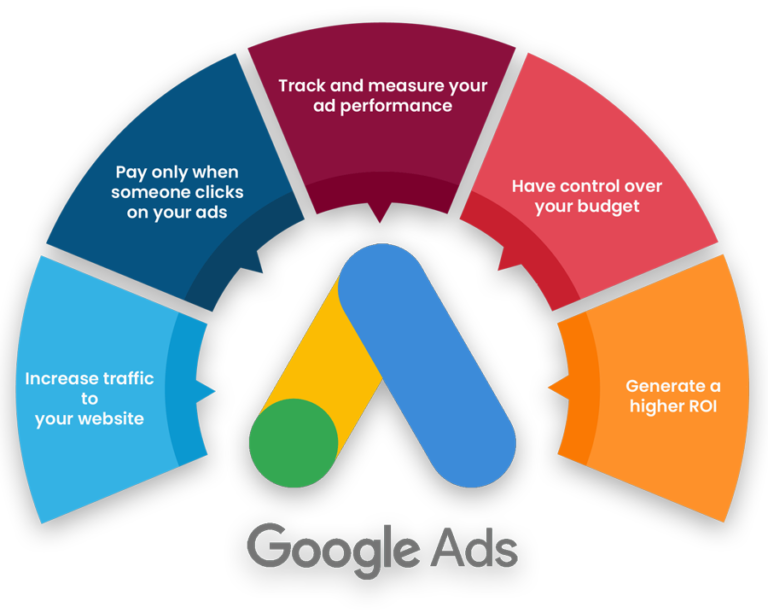
(Source: Verve Innovation)
Facebook Ads for Hospital Advertising
If you’re not sure what Facebook advertising is, it’s time to take a crash course.
77% of marketers use Facebook ads for advertising their business.
Facebook ads are a form of digital marketing and social media advertising that lets you show your audience relevant content in their newsfeed.
You pay for healthcare ads on Facebook. These ads appear in people’s newsfeeds, much like any other post. However, you’re paying for these posts, so they occur more frequently in your targeted user groups’ newsfeeds.
For example, if you’re a hospital, your ad can say get a free consultation at our office! Call us at 123-456-7890! Then, if someone sees that ad and calls up, you have gotten a potential new patient.
How does it work?
There are plenty of good reasons you should consider advertising on Facebook, but it can be hard to know where to start when creating your first ad campaign. Here’s how to make the most of your healthcare Facebook ads and get started on the right foot with your PPC hospital marketing strategy.
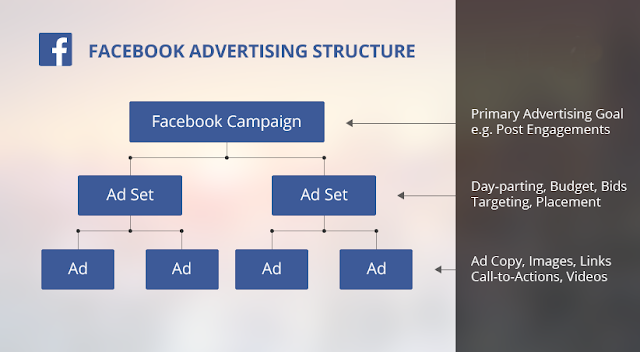
(Source: Digital Engine Land)
First, you choose an ad objective that matches your business goals, then create healthcare ads on Facebook by selecting a photo or video and filling out some text fields about your offer.
Then you pay for your healthcare ads on Facebook. Once it runs, many people will see it (depending on how much you paid for it) and be compelled to click through or like it depending on your objective. You can target users based on age, gender, location, interests, etc. The best part? It’s super easy to set up!
Google vs Facebook Ads for Healthcare: 5 Key Differences
Google Ads and Facebook Ads are the most prominent players in PPC healthcare, but how do they compare? Where should you spend your advertising dollars?
You may have tried using healthcare Google ads and healthcare Facebook ads to market your medical practice. But are you confident that you’re using them correctly and getting a high return on investment (ROI)?
With so many ways to advertise online, it can be hard to compare Google vs Facebook ads for healthcare, mainly since these two platforms use slightly different advertising styles and offer unique advantages and disadvantages in how they work.
Let’s look at some of those differences and determine which platform will give you better results overall for your practice.
1) Customer-base
With over a billion users and an average daily search of over 8.5 billion, you will have an easier time getting your ads noticed and clicked on Google. On the other hand, Facebook has more than 1.7 billion daily users. Nevertheless, both platforms can offer excellent results if you know how to use them correctly!
2) Buyer Intent
Concerning buyer intent, healthcare Google Ads outperform Facebook ads for healthcare. These medical paid search ads will put your company ahead of potential consumers when they require your services.
In addition, Facebook Ads are less likely to convert leads quickly. People who spend time on Facebook do so to interact and relax. Facebook does not prioritize shopping. Google Ads should be your first port of call if you want immediate conversions.
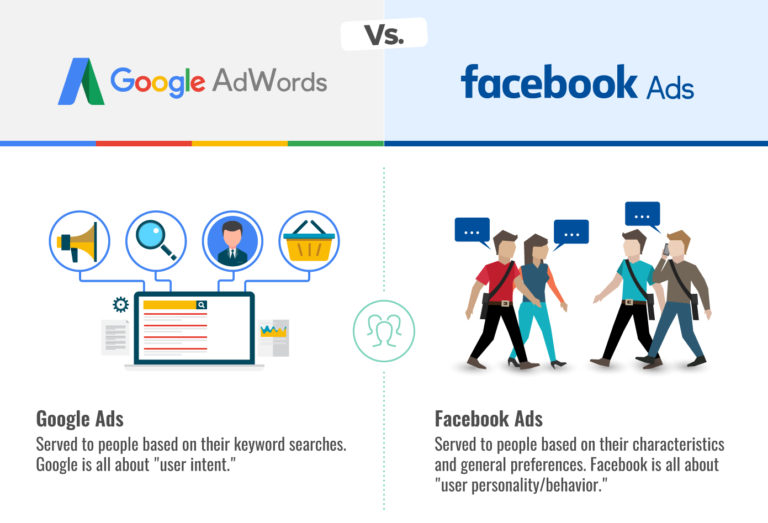
(Source: Perfect Web Creations)
With Facebook ads for healthcare, you’ll have a better chance of generating leads interested in your medical products or services because their ads are more personalized than healthcare Google Ads.
However, if you want to target people who have already expressed interest in your business or industry, Google Ads may be better.
3) Price
While you can use CPC on both platforms, Google’s ads (with a CPC of $2.62) tend to be more expensive than healthcare Facebook ads because they have a higher clickthrough rate of 3.27%. On top of that, CPC costs on Facebook are often lower ($1.32 on average) because their ad targeting is precise.
In a nutshell, medical paid search ads are less expensive, but they also have a lower average average conversion rate of 3.36%. Meanwhile, Facebook Ads for healthcare have a CTR of 0.83% and a conversion rate of 11.00%.
4) Ad Formats
With regards to ad formats, Facebook allows for more innovation. For example, to utilize Google Ads, you must use a limited string of words to catch the attention of potential customers on Search Engines. When using medical paid search ads, you can use ad extensions to add more information and text, but your format will ultimately be limited to text.
Meanwhile, Facebook’s image-based ads allow you to include a visual appeal to your message. Facebook avoids ‘ad fatigue’ by constantly introducing new ad formats. Here are some of the unique features you can find on Facebook Ads:
- Lead ads
- Engagement ads on wall posts
- Behavioral targeting
- Facebook Pixel
- Facebook Messenger Bots
Google vs Facebook Ads: Which is Best for Your Medical Practice?
Google and Facebook both make it easy to pay to put your ads in front of people who are likely to buy from you, but which one will work best for your healthcare practice?
Here’s how a hybrid Google and Facebook ads for healthcare campaign works: You choose one platform as your primary ad campaign—Google or Facebook—and then layer on secondary campaigns in other channels. For example, if you primarily use Google Ads to promote your practice online, you can add Facebook retargeting campaigns to your mix.
When someone visits your website but doesn’t convert, they get served ads via social media sites such as Facebook. However, these aren’t direct advertisements. Instead, they show up in users’ newsfeeds and remind them about your product or service.
Such ads can be highly effective because people who already visited your site may not remember it.
Retargeting helps them recall why they were interested in your company in the first place so that they might revisit it later on down the road. It’s all about helping customers stay top-of-mind so that you’re always at their fingertips when it comes time to make a decision.
The bottom line? If you want to maximize your return on investment, consider implementing a hybrid Google and Facebook ads campaign into your healthcare PPC ad strategy.
Leverage a Hybrid Google and Facebook Ads Strategy
Suppose you’re already spending money on Google Ads and Facebook Ads. In that case, you may be wondering which platform might be better for increasing your visibility and attracting new patients to your practice.
While there are plenty of benefits to using just one platform, at least at first, there are also advantages to developing an integrated digital marketing campaign that utilizes multiple advertising channels.
However, it may be overwhelming to run your healthcare PPC campaign on diverse channels simultaneously without the help of a professional agency that offers PPC services for healthcare.
Flying V Group offers top-notch PPC services for healthcare. Our full-service digital marketing firm has a team of experts that will not rest until you have your desired results. Contact us!

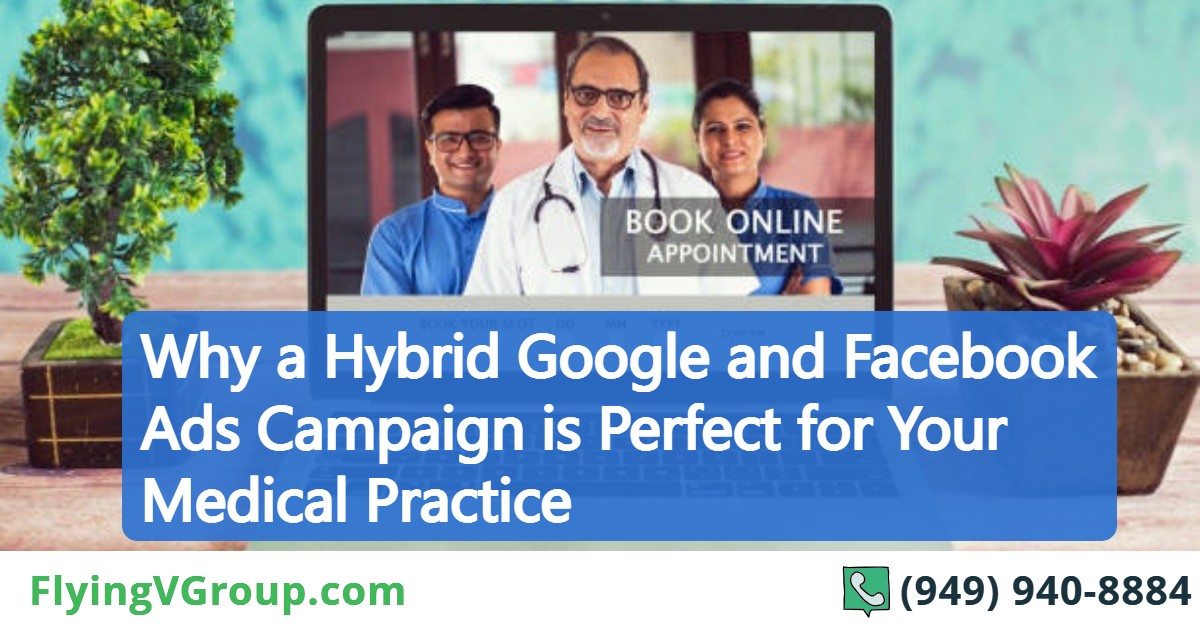




0 Comments